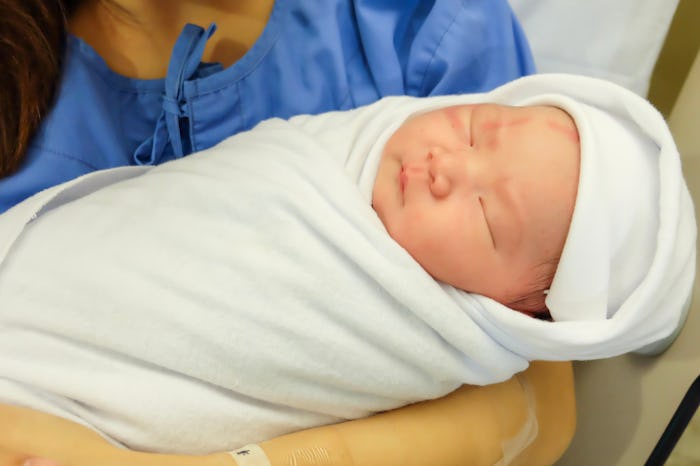Life

Here's What Experts Say About Breastfeeding With HIV
How you choose to feed your baby is a deeply personal choice. There are moms who strictly bottle-feed, some who exclusively breastfeed, and others who do a mix of two based on convenience and need. But there are some instances where choice doesn't come into it: it's not safe for moms tested HIV-positive to breastfeed.
HIV can be spread through body fluids, including breast milk, the Centers for Disease Control explains. Which is why, to reduce the risk of transmitting the virus, it’s advised to formula-feed your baby. “In the United States — and countries where mothers have access to clean water and formula feeding is acceptable, affordable, and safe — the American Academy of Pediatrics recommends that HIV-infected mothers avoid breastfeeding their infants,” Dr. Alison Mitzner, MD, a board-certified pediatrician, tells Romper. She adds that this is the case regardless of factors including whether a person is undergoing Antiretroviral Treatment (ART), which uses a combination of antiretroviral drugs designed to slow down the progression of infection, or the maternal viral load, the amount of the virus located in the mother's plasma.
If you are a carrier of HIV and assume your baby will be born with the virus, there is actually good news. You have a 99% chance of not passing HIV to your baby. To prevent spreading the disease, the American College Of Obstetricians And Gynecologists (ACOG) advises moms take anti-HIV drugs during pregnancy, labor, and delivery, deliver via C-section, give anti-HIV drugs to their baby after birth, and not breastfeed.
So what are the actual risks of transmitting HIV to your baby through breastfeeding? The World Health Organization reported in its study "HIV Transmission Through Breastfeeding” that the probability of infants becoming infected during breastfeeding IS between 5-20%. That’s why moms-to-be need to be educated in order to make an informed decision about postpartum feeding options. “All HIV-infected women should be counseled regarding breastfeeding their infants because of the continued possibility of HIV transmission,” recommends Dr. Mitzner.
Interestingly enough, there are instances in which new moms are actually encouraged to breastfeed their babies, even if they have HIV. In impoverished nations, HIV-infected moms should exclusively breastfeed their babies for the first six months, the CDC states. In fact, they can continue to nurse until the child is 12 months old, in addition to providing food. Why the contradiction? “This is because the risk is greater from getting sick due to contaminated water and dying than from HIV,” Andrea Tran, RN, BAS, MA, IBCLC, a lactation consultant, explains to Romper.
Just because a mom is HIV positive doesn’t mean that her baby has to have formula, though. If you want your baby to have breast milk rather than formula, you can look for donor milk from a reputable source. The U.S. Food & Drug Administration recommends speaking to your health care provider first or reaching out to your state’s department of health to learn about the availability of human milk banks near you. So if you are pregnant and HIV-infected, speak with your doctor to discuss what to do during pregnancy and postpartum to guarantee good health for both of you.
Study referenced:
World Health Organization, UNICEF, UNAIDS, UNFPA (2007). HIV Transmission Through Breastfeeding https://www.who.int/nutrition/topics/Paper_5_Infant_Feeding_bangkok.pdf
Experts:
Dr. Alison Mitzner, MD, board-certified pediatrician in New York
Andrea Tran, RN, BAS, MA, IBCLC, lactation consultant
This article was originally published on